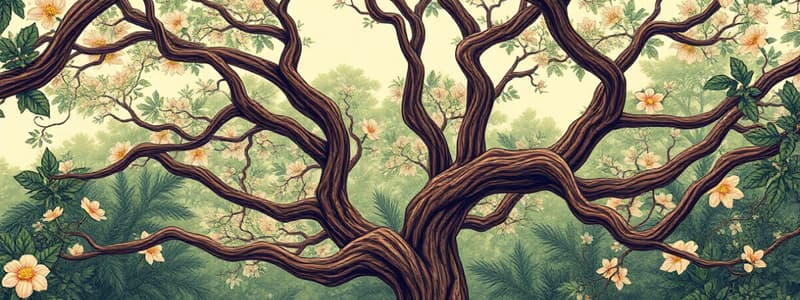Podcast
Questions and Answers
Malabayabas, scientifically known as Tristaniopsis decorticata, is primarily found in which region of the Philippines?
Malabayabas, scientifically known as Tristaniopsis decorticata, is primarily found in which region of the Philippines?
- Cordillera region
- Baguio City
- Visayas region
- Palawan (correct)
Malabayabas is classified as a softwood species.
Malabayabas is classified as a softwood species.
False (B)
What characteristic of Malabayabas bark makes it easily identifiable?
What characteristic of Malabayabas bark makes it easily identifiable?
peeling bark
The Saleng tree is commonly known as the ______ pine.
The Saleng tree is commonly known as the ______ pine.
Match the tree with its common usage:
Match the tree with its common usage:
Where does the Saleng tree primarily thrive in the Philippines?
Where does the Saleng tree primarily thrive in the Philippines?
Saleng trees are naturally found at elevations below 500 meters.
Saleng trees are naturally found at elevations below 500 meters.
Besides timber, what other product derived from Saleng trees has historical significance?
Besides timber, what other product derived from Saleng trees has historical significance?
Malabayabas belongs to the ______ family of plants.
Malabayabas belongs to the ______ family of plants.
What is a key characteristic of Saleng trees that distinguishes them as a coniferous species?
What is a key characteristic of Saleng trees that distinguishes them as a coniferous species?
Malabayabas is the most durable wood in the Philippines.
Malabayabas is the most durable wood in the Philippines.
What type of climate does the Malabayabas tree thrive in?
What type of climate does the Malabayabas tree thrive in?
Which of the following is NOT a common application of Malabayabas wood?
Which of the following is NOT a common application of Malabayabas wood?
The resin from Saleng trees is currently widely used in the Philippines.
The resin from Saleng trees is currently widely used in the Philippines.
Due to its toughness and resistance to water, Malabayabas wood is frequently used in the construction of boat ______.
Due to its toughness and resistance to water, Malabayabas wood is frequently used in the construction of boat ______.
Match the tree with its scientific name:
Match the tree with its scientific name:
What is primary use for the soft and light timber of the Saleng tree (Pinus kesiya)?
What is primary use for the soft and light timber of the Saleng tree (Pinus kesiya)?
Malabayabas bark is typically smooth and gray.
Malabayabas bark is typically smooth and gray.
What is the significance of the elevation at which Saleng trees grow?
What is the significance of the elevation at which Saleng trees grow?
The striking bark of the Malabayabas tree has reddish ______ hues
The striking bark of the Malabayabas tree has reddish ______ hues
Flashcards
Malabayabas (Tristaniopsis decorticata)
Malabayabas (Tristaniopsis decorticata)
A native hardwood species found primarily in the Philippines, known for being the second hardest wood in the country.
Characteristics of Malabayabas
Characteristics of Malabayabas
A medium to large-sized evergreen tree with attractive peeling bark that reveals a smooth, mottled surface with reddish-orange hues.
Uses of Malabayabas wood
Uses of Malabayabas wood
The tree's hard, durable wood is ideal for heavy construction, including house framing, beams, posts, and flooring. It is also used in boat construction, particularly for boat keels and framework, due to its toughness and resistance to water
Saleng (Pinus kesiya)
Saleng (Pinus kesiya)
Signup and view all the flashcards
Characteristics of Saleng
Characteristics of Saleng
Signup and view all the flashcards
Uses of Saleng
Uses of Saleng
Signup and view all the flashcards
Study Notes
- The presentation covers Malabayabas and Saleng trees.
- The objectives of the presentation are to identify the characteristics and explore the uses of malabayabas and saleng in various industries.
Malabayabas (Tristaniopsis decorticata)
- The Malabayabas tree, scientifically known as Tristaniopsis decorticata, is also locally called Palawan Malabayabas.
- It is a native hardwood species primarily found in the forests of Palawan, Philippines.
- This tree belongs to the Myrtaceae family, which also includes eucalyptus and guava.
- Malabayabas is recognized as the second hardest wood in the Philippines, following Magkono.
Characteristics of Malabayabas
- Malabayabas is a medium- to large-sized evergreen tree.
- It is known for its attractive peeling bark, which reveals a smooth, mottled surface beneath.
- The bark has striking reddish-orange hues and peels away in strips.
- This tree thrives in lowland forests and is well-adapted to the tropical climate of its native region.
Uses of Malabayabas
- The hard and durable wood of Malabayabas is suitable for heavy construction, like house framing, beams, posts, and flooring.
- Due to its toughness and resistance to water, it is also used in boat construction, specifically for boat keels and framework.
Saleng (Pinus kesiya)
- The Saleng tree, scientifically known as Pinus kesiya, is commonly called the Benguet pine
- It is a coniferous tree found in the highlands of the Philippines, particularly in Baguio City and the Cordillera region.
- It is the only naturally occurring pine species in the country.
- It thrives in cool, mountainous climates at elevations ranging from 500 to 2,500 meters.
Characteristics of Saleng
- Saleng (Pinus kesiya) is a large evergreen tree.
- It has needle-like leaves, thick, reddish-brown bark, a tall, straight trunk, and ovoid cones.
Uses of Saleng
- The soft and light timber of Pinus kesiya is versatile and used for boxes, paper pulp, and temporary electric poles.
- The good-quality resin, though not abundant, was historically used during the Spanish colonial period in the Philippines for turpentine production.
Studying That Suits You
Use AI to generate personalized quizzes and flashcards to suit your learning preferences.
